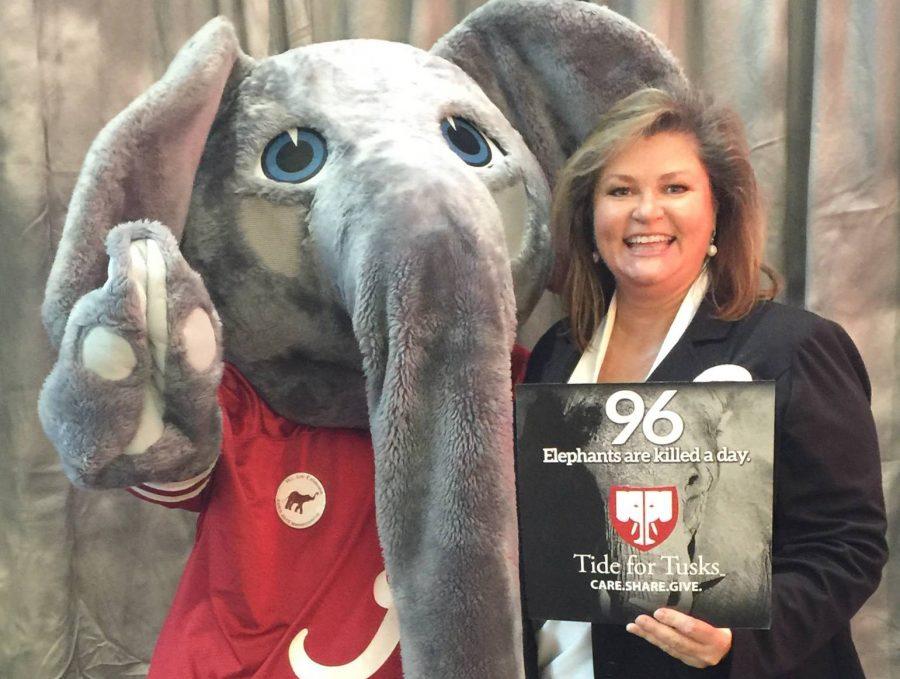On the sidelines of a football game Big Al and The Tiger are full of life, but in the wild their counterparts are being killed at an alarming rate. So while The University of Alabama and Clemson University’s football teams took to the field as rivals, Alabama’s Tide for Tusks and Clemson’s Tigers for Tigers took to social media as partners in the fight for conservation.
Created at the University in 2013, Tide for Tusks raises awareness for the poaching of African elephants and works to promote a deeper understanding of the trafficking of endangered wildlife.
Similarly, Tigers for Tigers is a national coalition that is present on eight college campuses with tiger mascots. They work to prevent tiger extinction and raise awareness regarding poaching, trafficking and habitat loss.
During the National Championship game, the two organizations led a joint social media campaign in which they asked students and fans to show solidarity for their wild mascots.
They encouraged people to use the hashtag #ProtectOurMascots while creating images with phrases like “Rivals on the field, Partners in the wild,” “Our mascots may win on the field, but in the wild they are losing the game,” and “They stand with us. Let’s stand with them!”
Reata Strickland, vice president and co-founder of the Tide for Tusks non-profit, said the point of the campaign was to raise awareness.
The campaign reached over 22,000 people on Facebook the night of the game and over one million people on Twitter. It was also featured on over 275 websites and blogs and was picked up by media outlets like Yahoo! News.
“I think [the campaign] was very far reaching and over the coming months we will see the benefits of this campaign,” said Randall Mecredy, faculty advisor and president of the non-profit.
Tide for Tusks and Tigers for Tigers connected after Michael Steinberg, associate professor and Tide for Tusks non-profit board member, contacted Tigers for Tigers about working together.
“It allows us to reach more people together than we can apart,” said Maddie Karwich, president of the Tide for Tusks student organization, which is why Tide for Tusks has also paired up with the conservation non-profit 96 Elephants for other projects.
Sean Carnell, National Spirit Campaign Manager for Tigers for Tigers, said the partnership with Tide for Tusks is beneficial for both programs. Tide for Tusks has a top-down three-pronged approach with a non-profit, a student-run organization and a class, while Tigers for Tigers is more of a grass-roots effort.
“We were able to learn from each other and see the benefits of both approaches,” Carnell said.
The organizations decided to work together before they knew that Alabama and Clemson would face each other in the National Championship. When both teams advanced passed the semi-finals, they realized the game would be a great stage for a campaign.
According to Carnell, the campaign helped redefine the schools’ identities to ones of solidarity instead of rivalry.
“To show rivals were unified for a greater cause of preservation lends a lot of weight to our message,” Karwich said.
Karwich believes the campaign and the efforts of both groups are important because most people don’t know the gravity of the situations their mascots are in. They don’t know that 96 elephants are killed every day, and less than 3,200 tigers remain in the wild.
Strickland said as the largest college with an elephant mascot, we have a responsibility to protect the gentle giant that represents our school.
“We don’t want to be the first universities with extinct mascots,” Karwich said, “We want future students to be able to see their mascots in real life.”
For more information on Tide for Tusks and how to join, go to tidefortusks.org and like them on Facebook at “Tide for Tusks- Student Organization” and the non-profit’s page, “Tide for Tusks.” Their first student meeting of the semester will be Jan. 26 at 5:45 p.m. in Lloyd 123.
For more information on Tigers for Tigers go to tigersfortigers.org.









